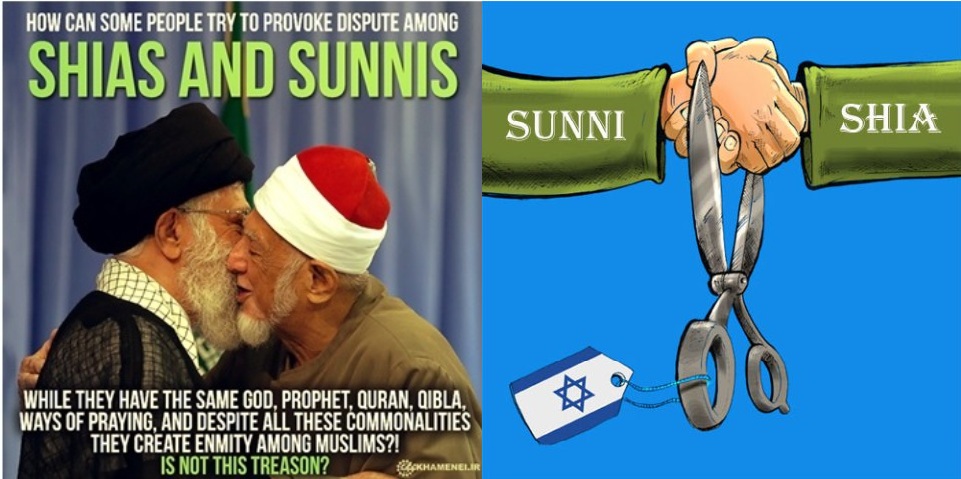The root-cause of the ongoing bloodshed in Yemen, Iraq, and Syria is the unresolved dichotomy between Shiite and Sunni Muslims, the two major sects of Islam.
The Sunnis represent a vast majority of the estimated 1.6 billion Muslims worldwide, around 80-85%. But while Shiites are a numerical minority among Muslims (10-15%), they have been trying to reassert themselves in many different ways, especially since the triumph of the Iranian revolution, under the leadership of the late Ayatullah Khomeini in 1978.
As a result, ancient animosities which many thought had been buried in the cemetery of history were rekindled. Thus the war between Ali Bin Abi Taleb and Muawiya ibn Abi Sufian and similar historical events have effectively become a subject of fierce contention as if they took place yesterday.
In fact, the proper place to raise and discuss these issues would be History Departments in Universities were it not for the fact that some people, e.g. the Shiites, continue to inextricably cling to some of these events, despite the passage of more than a thousand years.
Also Read: Boycott of Zionism, The Most Powerful Weapon
Exporting Shiism
One of Iran’s paramount though undeclared strategies has been to the propagation of the Shiite brand of Islam, not among non-Muslims, but mainly in majority-Sunni countries.
The often furtive proselytizing was initially tolerated and downplayed in many Sunni quarters. However, when these efforts became brazen and quite aggressive, some Sunni governments and popular movements began to sense the peril and consequently became increasingly uneasy about Iranian intentions.
For example, the governments of Sudan and Malaysia effectively outlawed Shiism and closed Iranian “cultural centers” within their territories. Moreover, many Sunni satellite TV stations and other media outlets waged an incessant propaganda war against the perceived Shiite onslaught, illustrating the alleged polytheism, paganism, and anthropomorphism of the Shiites, including the purported worship of saints and imams.
Also Read: Nuclear Technology: Harm and Benefit from the Qur’anic Perspective
The Syrian quagmire
The ongoing sectarian violence in Iraq and especially the internecine war in Syria galvanized both sides in ways unprecedented since time immemorial.
The Shiites argued that they were defending Shiism and Shiite shrines against Salafi Sunnis who wanted to create a (Sunni) Islamic state after defeating and unseating Bashar al Assad. Interestingly, Assad is not really a Shiite or even Muslim. He is as much Muslim as Adolph Hitler was Christian.
What else can be said of a tyrant who has killed or caused the death of more than 250,000 Syrians, virtually completely destroyed his country and forced as many as 13 million Syrians to leave their homes, all in order to extend the rule of his clan by a few more years?
Also Read: Gaza Cries Out, the World Stays Silent: A Wounded Humanity
Predictably, the Iranians are not short of arguments to defend and justify their destructive involvement in Syria. However, a careful examination of Iranian arguments in this regard shows the utter disingenuousness of Iranian claims. Eventually, the true Iranian position can be summarized in one word: Blind sectarianism.
In fact, the undeclared Iranian motto sounds like this: A Shiite Hitler is preferred over a Sunni saint. Otherwise, what affinity is there between Ithna Ashari Shiism and atheistic Baath socialism, the official ideology of Assad and his ruling regime?
I am touching on the sectarian dimension of Shiite-Sunni binary because it is the crux of the matter. Don’t you believe anyone who would tell you otherwise.
Is there a hope for a peaceful coexistence?
Also Read: Indo Defence Expo and Forum; Sharing Responsibility of Humankind and Environment
What can be done to alleviate or even stabilize this perpetual showdown between the two camps?
I know too well that even the best possible answer may not be good enough to deal with this issue appropriately.
However, I believe certain ideas can be helpful.
It is no secret that the root-cause of animosity and mutual suspicions between Shiites and Sunnis is the repulsive Shiite habit of maligning the Prophet, his family and Companions.
Also Read: Safiya Saeed: From Somali Migrant to First Hijab-Wearing Mayor of Sheffield
Hence, as the first order of mitigating this bloody showdown, the Shiites must make genuine efforts to stop badmouthing the religious symbols of Sunni Islam. I am saying this because unless this particular issue is treated constructively and with good will, there is no practical hope for any breakthrough between the two communities.
As a Sunni Muslim, I am not asking the Shiites to fall in love with Omar, Abu Bakr and A’aisha. I am only asking them to stop this hateful incitement and defamation. The Shiites have been cursing the Sahaba of the Prophets for centuries. What have they achieved other than fostering ill will, mistrust and animosity among Muslims.
There is a universal rule upon which peaceful coexistence between peoples and individuals all over the world is based. It is called “mutual respect.”
Unfortunately, apart from some politically-motivated half-hearted statements by Iranian officials, there has never been a solemn undertaking by the main Shiite seminaries in Qum and Najaf to outlaw the provocative repulsive practice.
Also Read: Why Food Safety is Essential During Hajj Services?
I don’t know if the Shiites have demands of their own they wish to make. In fact, I have never ever come across a Sunni Muslim maligning Shiite symbols and saints. None the less, Shiites are always welcomed to present their legitimate grievances.
I know that true brotherhood between Shiites and Sunnis are second to impossible under the current circumstances.
However, for the sake of peaceful coexistence, the followers of the two camps must at the very least recognize the common humanity of the other. In short, we ought to adopt a modicum of civility in viewing and dealing with each other.
This is not difficult to achieve. People from both camps do perfectly coexist with people espousing entirely different religious traditions, even people who believe in no religion and no God.
Also Read: Indonesia Sign Language Mushaf Qur’an; A Sustainable Gift in Celebrating Pancasila Birthday
A final point … much of the mutual hatred between Sunnis and Shiites is imputed to ancient books containing all sorts of incitement and name-calling of the other side. And in numerous cases, scholars from both sides readily acknowledge the spurious nature of these books.
Hence, it is imperative on both sides to disown these “yellow books” which, although written a thousand years ago or more, continue to poison our lives. On this occasion, I would like to thank and salute the Iraqi Shiite Kamal al-Haydari for his strenuous efforts in this field.
We Muslims are supposed to have a pure and perfect religion, which is the last testament to mankind. Therefore, it is not Islam that needs to be reformed; it is rather our often screwed understanding of it and especially our behaviors that need to be reformed. (T/P3/R01)
Mi’raj Islamic News Agency (MINA)
Also Read: Leila Khaled, The Icon of Palestinian Women’s Resistance
![khalid-amayreh_300_01[1]](http://mirajnews.com/wp-content/uploads/2014/11/khalid-amayreh_300_011.jpg) *Khalid Amayreh is a Palestinian journalist and political commentator living in Occupied Palestine.
*Khalid Amayreh is a Palestinian journalist and political commentator living in Occupied Palestine.
Source: http://english.palinfo.com/site/pages/details.aspx?itemid=70975
Also Read: The Twilight of the Zionist Israeli State












![Israeli tanks and APC’s gather by the Israeli – Lebanese border. Amid Israel’s escalating campaign against Hezbollah in Lebanon on September 30, 2024. [Erik Marmor/Getty Images]](https://en.minanews.net/wp-content/uploads/2024/10/IMG_20241001_203226-300x197.jpg)
























 Mina Indonesia
Mina Indonesia Mina Arabic
Mina Arabic